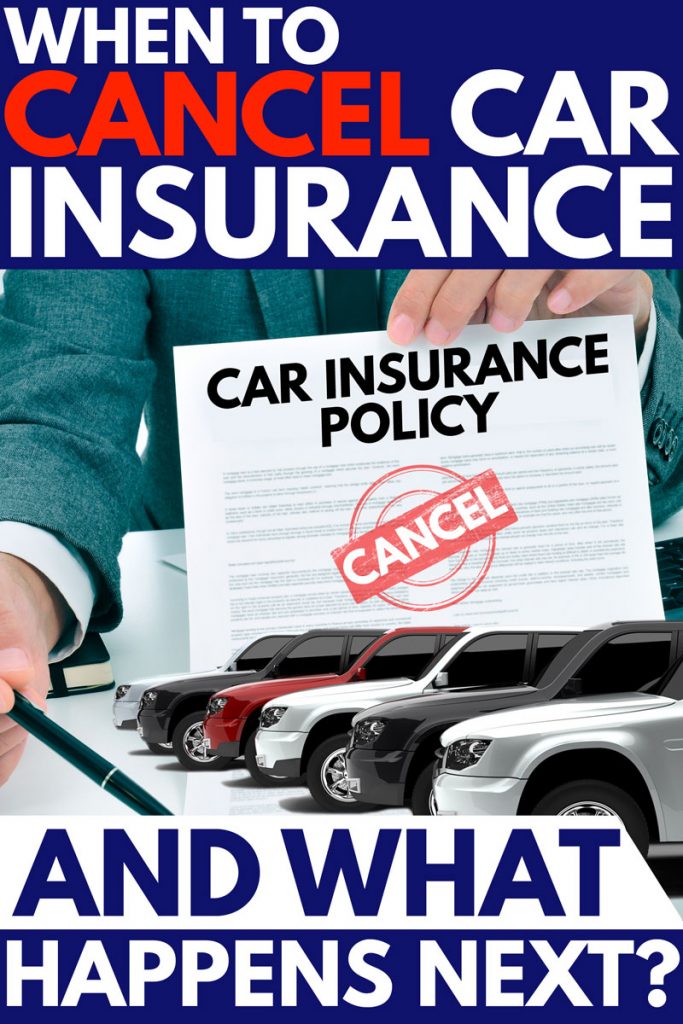When you switch car insurance carriers you are often left wondering what to do with your old policy, and when. Car insurance does not seamlessly transition from one company to another, you have to manually cancel your old policy or you would end up paying two premiums. Should you cancel your policy early to save some money, or after your new policy is in effect? Overall, when is the best time to cancel your car insurance?
The best time to cancel your existing car insurance policy is after you have a new policy set in place and effective. You want to make sure that you are without a lapse in coverage, and finding out the beginning coverage date of your new policy is essential. Only once you've made your first payment and completed the process of opening a new policy, should you cancel your existing policy.

As with most topics related to insurance details, knowing when you should cancel a policy can be complicated. Your old insurance carrier clearly doesn't want you to cancel your policy and they can make finding information on this topic difficult. This post dives into the topic and makes sure you are equipped with the best information to move forward.
Why Cancel My Car Insurance Policy?
There are several reasons why you might want to cancel your car insurance. You may be moving to a new state where your current carrier doesn't provide coverage. You may have had a bad experience with your insurance company or agent. The most common reason is that you may find a lower rate or better coverage with another company and want to switch.
Do I Need Car Insurance?
There are currently only two out of fifty states that do not require you to carry car insurance coverage. You are still required to show that you're financial reliable in the case of an accident. Even in places where you may not need insurance or the minimum requirements are low, you should still consider purchasing the coverage that best suits your habits. At the end of the day, saving on low or no coverage is greatly offset by possible property damage or liability in the case of an accident.
How Do I Cancel My Car Insurance?
Though insurance companies often do not make your options obvious because they'd like you to keep your policy, there are some basic ways that you can cancel most insurance policies.
You can call in your request to cancel coverage. Sometimes this works with one call, but oftentimes your carrier will need you to review cancellation documents or sign paperwork. If you are switching companies because you found a lower price, you can ask the call representative if discounts can be added to your policy to keep you as a customer. If you find a lower rate this way, you may be able to avoid the entire process altogether.
A more traditional approach is to mail in or fax your cancellation request. Type the date, your name, policy number, and request cancellation with a signature and that should be the end of it. You can address this to your insurance carrier or to your individual agent.
Finally, you can go in person to speak to your agent and have them cancel the policy for you. You'll be able to sign your request in person and finish everything up in one visit.
Can I Cancel My Car Insurance If I Pay Monthly?
Paying your car insurance premiums monthly as opposed to longer terms can make canceling your policy simpler. If you cancel your 6-month policy that was paid in full halfway through, your carrier will have to find out exactly how much should be refunded and then get the extra premium you paid back to you. If you pay monthly you simply don't pay for the insurance once it's canceled and there is no waiting period to get your extra premium refunded to you.
You should find out if your car insurance company charges cancellation fees. Most will refund your unused premium completely, but some companies will deduct a fee because you cancel during the term.
How Long Does it Take for Your Car Insurance to be Canceled?
If you don't pay your monthly car insurance premium, there is usually a grace period offered to you by the insurance company. This is a window of time where you can pay the missed premium and coverage will be restored. More importantly, if you catch up and pay during the grace period, then there won't be a lapse in coverage. Car insurance companies extend the grace period to help people by preventing them from becoming instantly uninsured if they miss a payment by a few days.
There is no state-wide standard for mandated grace periods. Some companies give you only 3 days while another may offer you a full month grace period. Some states have a minimum insurance grace period mandate, like NY state, that requires insureds to be provided with a 15 day grace period.
What Happens If My Car Insurance is Canceled?
If you aren’t able to pay your premium on time and miss your grace period, your insurance carrier has the full right to stop your coverage. This would mean that you have no insurance benefits if you were to cause property damage or get into an accident. In the states where car insurance is mandatory, you would even incur fines because you don’t have coverage at the time of an incident. You should never be without some form of car insurance because the consequences can be financially disastrous
You should immediately try to find a new car insurance company to cover you as soon as possible if your policy was canceled. Even the smallest and most routine drive can become an enormous headache in an instant. Even if the damages are not your fault, you would still be penalized. Insurance companies in good standing won’t backdate coverage either, so you have no opportunity to cover yourself retrospectively either.
What Alternative Do I Have Instead of Canceling my Car Insurance?
The most common reason for canceling your car insurance policy isn’t the first place is that you want lower premiums. You may have found another company that offers lower costs or you want to negotiate for a lower price with your current company. Instead of hastily deciding to cancel your current policy there are some things you can do first to avoid the problem entirely.
You can check with your insurance agent to see if there are discounts that you can apply to lower your premium. Perhaps you can also re-evaluate your coverage and reduce your premium by only taking the amount of insurance you really need. Oftentimes people carry more insurance than they need and end up overspending on premiums.
Cancel Your Car Insurance Once You’re Covered.
There are a lot of things to consider when switching or ceasing your car insurance. The most important thing to remember is to only cancel once you’ve started receiving coverage from a new carrier. You never want to be caught in a bind while uninsured. With a little bit of preparation and planning, you can be ready to make good decisions.



